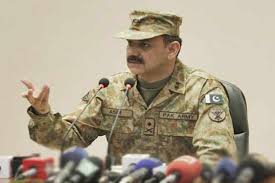
ISLAMABAD: Pakistan’s top military spokesman on Wednesday said that the country wants peace on its borders, but is ready to respond to any form of aggression from its neighbours.
“We do not want to disrupt peace but if the other side resorts to aggression then it will be responded accordingly,” said Director General Inter-Services Public Relations (ISPR) Major General Asim Bajwa while speaking to reporters here today.
The spokesman’s words follow an intense exchange of mortar and gunfire by Indian and Pakistani forces along the workiong boundary and border dividing disputed Kashmir.
The recent violence killed at least 20 civilians and wounded dozens in the worst violation to date of a 2003 ceasefire. While the firing has abated, tension remains high along a 200-kilometre stretch of the border dividing the nuclear-armed neighbours.
Indian, Pakistani troops exchange fire at Sialkot’s Charwa sector
Meanwhile, a fresh exchange of gunfire took place at Sialkot’s Charwa sector between Indian and Pakistani troops, sources in the Chenab Rangers said on Wednesday.
No casualties were reported in the firing, sources said, adding that the exchange took place when Indian troops opened unprovoked fire aiming towards the Pakistani side.
Sources added that firing from the Indian side subsided following retaliation from Pakistan.
Ceasefire violations along the LoC and working boundary between Pakistan and India continue intermittently, with casualties reported on both sides.
Also read: India warns Pakistan of ‘more pain’ in border fighting
Both sides have been accusing one another for violation the ceasefire accord, leading to increased tension between the two neighbours.
On Tuesday, India’s Defence minister Arun Jaitley warned Pakistan, saying India’s armed forces would strongly retaliate to any future unprovoked attacks by Pakistan, and that their strength is greater.
“So if they persist with this, they’ll feel the pain of this adventurism,” Jaitley said in an interview. He claims that India is ready to have talks with Pakistan, provided Pakistan “creates” the environment for the talks to happen.
In December last year, the two countries pledged to uphold the 2003 ceasefire accord which had been left in tatters by repeated violations that year. The truce breaches had put the nascent bilateral peace dialogue on hold.
The Himalayan territory of Kashmir is divided between India and Pakistan by the UN-monitored de facto border of LoC but is claimed in full by both the countries.





